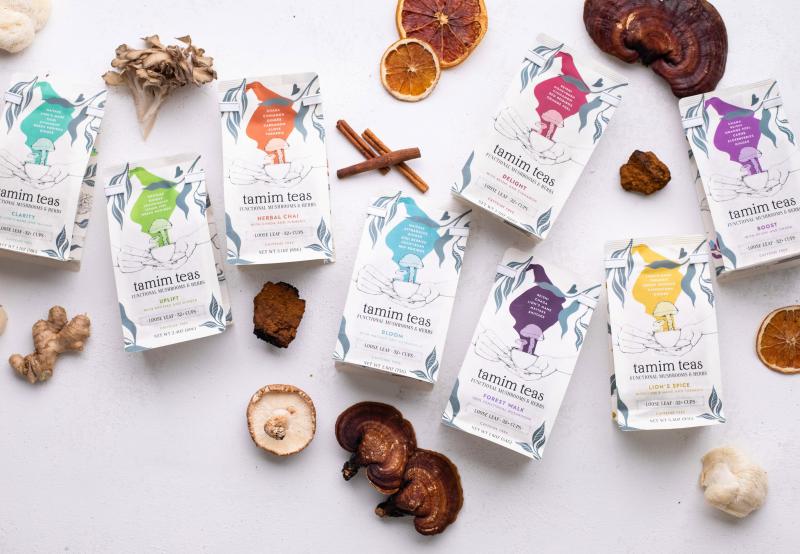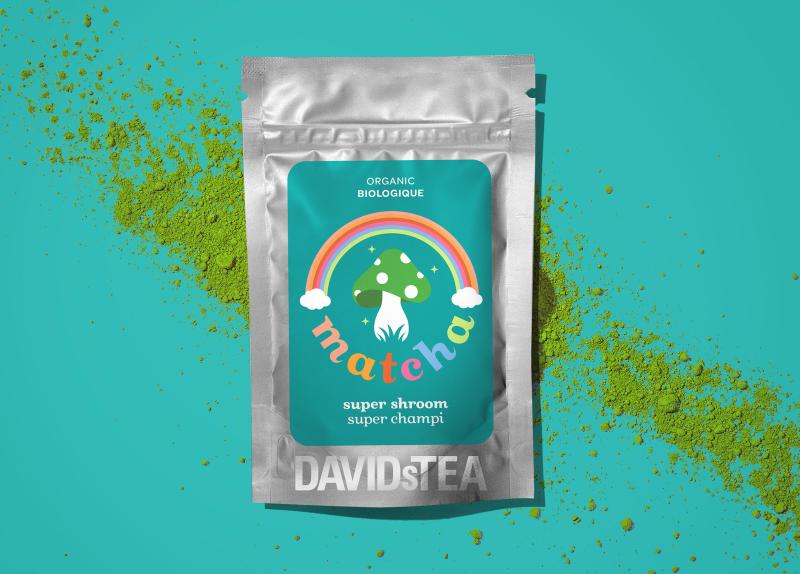Mushroom teas are having a moment. Over 1,000 results pop up on an Amazon search, and brands offering products range from artisanal startups to by-the-ton global producers.
With mushroom tea, It’s not just about taste (in fact, it’s rarely about the taste.) It's about the experience. It’s about health and nutrition benefits.
Mushroom tea is not for everyone, though, and bad reviews can dampen overall acceptance and lack of repeat customers.
The feedback can be extreme:
● “Dark and bitter with strong aftertaste. I will not be finishing this tea since I can't stand the taste.”
● “If you’re sensitive to smell and taste, you probably won’t like this. The texture on the tongue is a bit slimy.”
● “We threw this out after everyone tried it twice.”
● “There’s no way to sugarcoat it. This tea smells terrible.”
Yet, so far, criticism doesn't seem to be slowing the growth of the mushroom tea market. How is it possible that a product that generates this level of disgust is on a roll?
Something else, something powerful is at work.
What’s the Big Deal with Mushroom Tea?
Mushroom tea – an infusion of edible or medicinal mushrooms in water – has been used by humans for centuries. Over a dozen species of functional mushrooms are known for medicinal and healing properties. The names are exotic and pleasing: chaga, reishi, lion’s mane, scaly hedgehog, black hoof, lingzhi and more.
Many tea mushrooms come from Korea, Japan and China, but some are also native to North America.
But what’s the appeal?
Evidently, the appeal is real, because mushroom teas have been consumed for thousands of years, and the market is still on a roll. Due to purported health advantages, such as boosting immunity, functional mushrooms saw a pandemic spike. Now, tea fungi like lions mane, chaga and reishi are all forecast to grow at a considerable rate.
Health-Conscious Market for Mushroom Teas
“Functional mushrooms are incredibly high in antioxidants and have been prized in eastern medicine for thousands of years for immune support, inflammation, adrenal health, and even neuro-cognitive effects,” explains Liat Racin, founder of Tamim Teas.
Using functional mushrooms as extracts or powders appeal to the well-established, often well-healed health-conscious market. Social proof plays a part in spreading the appeal of these so-called superfoods. Although estimates vary, research puts the medicinal mushroom market in the billions by 2030.
Yet a gap between supply and demand is possible due to a dearth of production skills. As with other functional teas, reishi cultivation for example, is a protracted, sensitive process. A shortage of labor could slow the market's expansion. Environmental concerns and short shelf life also present challenges to the market for medicinal mushrooms in general.
Upside and Downside to Health Benefit Claims

The big allure of mushroom tea lies in the health benefit claims, including increased immunity, anti-cancer, weight control, and value for stomach-related problems, diabetes and high cholesterol. It's quite a wish list.
However, what sets this beverage market up for success could also be its worst enemy. A potentially limiting factor when it comes to chaga-based products and others in the mushroom tea space are possible side effects.
Although marketed as beneficial for a healthy lifestyle, tea brands that utilize mushrooms must be diligent about investigating and educating on possible side effects, such as allergic reactions or unsuitability for insulin users. Claims of trouble breathing and medical emergencies could dampen growth.
“We are very careful with making any claims,” explains Nadia De La Vega, DAVIDsTEA director of sustainability and tea content. The tea company offers mushroom tea as part of its line-up. “As a tea company, we focus and rely on the benefits of the ingredients themselves. Our team diligently monitors leading scientific research and regulations regarding food products to ensure we are aligned with local and federal food regulations.”
Maintaining Quality a Challenge with Mushroom Teas
Tea brands face plenty of challenges along the supply chain, from mushroom processing to market building, to packaging, shelf life and logistics, to the last mile of consumer experience. Mushroom tea can be delivered as tea bags, powder or as pieces of fungi themselves.
Quality can degrade quickly, and reputations suffer when perishable teas are poorly stored, or just old and lacking in flavor and scent. Consistency from batch to batch requires constant attention. Unreliable quality can spell ruin with dissatisfied customers.
Differentiating Products Through Organic Harvesting
Creating customer preference also involves educating about differentiators like organic processing and convenient formats. Brands like Tamim Teas distinguish themselves through ingredient integrity and organic production. Tamim Teas partners with organic family farmers in the United States to get the highest quality functional mushrooms.
“Sadly, most of these beautiful mushrooms are often heavily processed into instant powders, gummies or imported from unknown questionable sources. Some of these are absolutely fine, but I want to fight for mushroom integrity, and that's why I founded Tamim Teas. The only processing we do is cut whole mushrooms in small enough bits to fit your tea cup,” shares Racin.
Tea producer Sayan sustainably harvests wild Chaga from pristine Siberian birch tree forests, far from the pollution of civilization. Founded in 2007, Sayan is dedicated to spreading chaga mushrooms’ unparalleled health and wellness benefits around the globe, according to Sayan Co-Founder David Vartanian.
A newly released tea from JY Corporation of South Korea involves certified pesticide-free enoki mushrooms. In this large-scale operation, the company uses its own far-infrared hot air drying and special roasting technology to maximize nutrient content. The tea ingredient is produced and sold in batches measured in tonnage. The company distributes the product through representatives and is moving into franchise services to expand sales and distribution.
Sourcing high-quality mushrooms can be one of the hardest things about producing and marketing mushroom tea. “We are lucky to work with a trusted network of suppliers that share our values for high quality ingredients and ethical sourcing,” says De La Vega. “At DAVID’sTEA, we do our best to make tea as accessible as possible, so it was important to us to source and offer vegan-friendly cordyceps.”

How Do Consumers Drink Mushroom Tea?
Mushroom teas often incarnate in a powdered format like other healthy functional beverages. Market research cites convenience as an important factor in growing consumer adoption. Renude wellness beverages, among the many available through ecommerce, come in single-serve Chaga Matcha packets for on-the-go wellness.
An immediate dissolve can be a plus with picky drinkers, offering them a better user experience with powdered tea. Sayan, the chaga mushroom-based health and wellness supplement distributor, has developed an instant brewing chaga mushroom tea as a caffeine-free coffee alternative.
Others swear by more artisanal approaches. “We always source our functional mushrooms whole –never as a processed powder – and pair them with supportive herbs and spices for optimal taste, potency and functionality,” says Racin.
From Lowly Mushroom to Health Superstar
From meager fungi to international health sensation, mushroom teas are definitely having a moment. How big that market will get depends on a number of things.
Behind every mushroom tea brand are many challenges, from harvesting, production and distribution, to retail, shelf life and taste.
So far, these obstacles haven’t stopped the brands committed to bringing mushroom tea to consumers who desire it.
Racin says: “I am passionate about introducing people to the benefits of these amazing mushrooms in the same traditional manner in which they have been enjoyed for centuries – as a tea!”
Editor's Note: The term "tea" is used loosely in this article. True tea comes from the Camellia sinensis plant, and botanical/herbal teas are typically referred to as infusions or tisanes. World Tea News will explore this topic more in an upcoming edition.
Carro Ford is a successful marketer, researcher and writer/reporter based near Lexington, Ky. In addition to being an occasional contributor to Questex’s World Tea News and Bar & Restaurant News, she's worked in numerous industries and is also the author of The Smartass Marketer's Handbook: A Guide to B2B Marketing with Attitude.
Don’t Miss the Weekly World Tea News eNewsletter! Get your free subscription, if you’re not already subscribed, by clicking here.
Plan to Attend or Participate in World Tea Expo, March 18-20, 2024
To learn about other key developments, trends, issues, hot topics and products within the global tea community, plan to attend World Tea Expo, March 18-20, 2024 in Las Vegas, co-located with Bar & Restaurant Expo. Visit WorldTeaExpo.com.
To book your sponsorship or exhibit space at the World Tea Conference + Expo, or to enquire about advertising and sponsorship opportunities at World Tea News, contact:
Ellainy Karaboitis-Christopoulos
Business Development Manager, Questex
Phone: +1-212-895-8493
Email: [email protected]
Also, be sure to stay connected with World Tea Expo on social media for details and insights about the event. Follow us on Twitter, Facebook, Instagram and LinkedIn.
